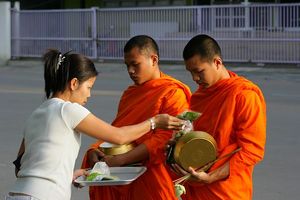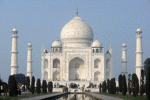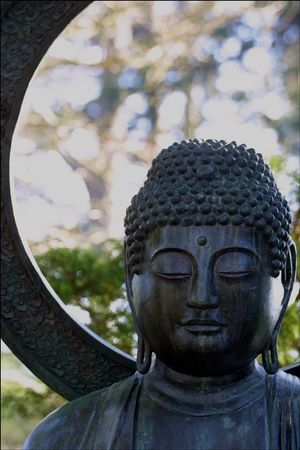Buddhism
The philosophy of Buddhism is yet an eastern doctrine of surrender, predating its French variation by well over two thousand years.[1] Buddhism was initially founded by a decadent prince to annoy his rich parents who wanted him to become a lawyer or doctor. Buddhism has become second only to Scientology in popularity amongst LA "loony bin types".
The doctrine has become world famous, with well-known names such as Richard Gere, Colin Farrell and Paris Hilton practicing the middle way philosophy. Many report it as being the best way to be ambiguous about everything, love the lowest common denominator, make no decisions and coast through life utterly underachieving. It is also an excellent environment for people to "process things", "have a personal journey" and do a lot of "me-myself-and-I".
The philosophy is quietly whispered by former terrorist/spiritual leader the Dalai Lama. Although those of the "Slow bullet proof glass box Vehicle" sect would prefer to see him conspicuously disappear, they do acknowledge that he looks hotter in those yellow robes than the Bishops' and Pope's dresses. To fulfill the Buddha's teachings of a non materialistic lifestyle people have been building thousands of statues of the Buddha for thousands of years, if Buddha was alive today, he'd be miffed that he is so fat and smiley because he was neither of those things. If he were alive today he'd look like a malnourished underperforming college boy under a tree with a guitar.
History[edit | edit source]
The first recordings of the movement were in Nepal, sometime in ancientness.[2] A wise king who was sometimes known as "The Wise King" ruled a minor kingdom and was informed by a horribly deformed woman with terrible skin complexion that should his son ever sit under a tree for 40 days, he would renounce his aristocratic leanings and lower himself to an affinity for the plebs.
The King, as was customary for rich Indians, was horrified of the notion of ordinariness and commoness and sent his child to the finest education Eton College and Oxford University could offer. After learning how to be an insufferable upper class snob, playing rudby for a few years, singing relentless college songs with his dinner palls and helping his British superiors plan the colonial conquest of their next victim nation, he contracted a terrible case of Chlamydia with a local English tart and was sent back home to India in shame and his arranged marriage was called off. After pissing blood for two months, he realized that emulating the worlds most dysfunctional people was not the path to happiness. However worshipping cows and six armed blue-beings as Gods seemed something of the opposite extreme to contentment. He left in search of peace and the middle way.
Beliefs[edit | edit source]

Gautama, under the pseudonym "Buddha"[3] spent some time walking around paths, learning local languages, subsisting on a single grain of rice every day and meditating in the sphere of the primordial nothingness. He encountered a lonely tree in a field and sat down thinking about his days in rainy, gloomy, miserable, maladjusted England and how much more content he was living the simple innocent life. Before he knew it, forty days had passed.
At first, it was difficult to convince others to subsist on a grain of rice, give away all their possessions, roam the streets like a stinking bum and turn their backs on thousands of years of tradition. However, when the locals discovered that their new lifestyle avoided things like intestinal worms, sectarian violence and general daily misery, they warmed up to his ideas.
The religion picked up steam and spread from Afghanistan to, Sri Lanka, to Mongolia to Japan.
Teachings[edit | edit source]

The teachings of Buddha, like most world religions, were written down well after the religious figure supposedly lived and died. However, because those who believe hold deeply held beliefs, we cannot question the authenticity of their writings or say anyhting critical or negative about it. The Chinese authorities have recently released a state approved version of the text which eliminates ideas of free thinking and inner reflection but holds onto the ideas of obeying your parents, doing things for the greater good and ensuring that Tibet is ruthlessly controlled at all costs. Something Bhudda would have clearly supported, all hail the great Chinese leaders.
The fairly oversimplified version is that wanting things leads to suffering so don't want things. Obviously you need Water (or do you?) and maybe oxygen, but apart from that, other needs are illusions. Sitting down and trying not to think puts you in touch with universal energy and allows you to escape the cycle of birth, death and rebirth. Bhudda admitted there is absolutely no shred of evidence for any of this, but for the most part, these beliefs have led to nothing but peace and a total lack of conflict and war in Bhuddist countries, with the slight exception of the deadly wars in Sri Lanka and Burma where the Tamils and Rohingya were only slightly murdered in a moderate middle path sort of way. Definitely not on the scale of a hollocaust. So, it's sort of like zen opression and zen genocide.
The Japanese put their own spin on Bhuddism with this very Zen idea, which includes making pretty gardens with stones and sayins like:
- What is the sound of one hand clapping
- Am I Nigel Farage dreaming I am a butterfly or am I a butterfly dreaming I'm a scum-bucket opportunistic maggoty bottom feeder?
- If someone scratches their ass and sniffs their finger and no one else is around to watch it, was it a social faux-pas?
The Dalai Lama vs. Richard Gere: Media whoring as the first and final precept of modern Buddhism[edit | edit source]
Media coverage of Richard Gere's faith has been the prime focus of all the various sects, most notably the Über-fundraiser extraordinaire, the Dalai Lama. He has been the spiritual and political leader of Buddhism. He was toppled by the Chinese in his territory of Tibet and has since been perfecting new skills via Machiavellian reading lists. The crisis with China has led to the failed statesman to a career of inciting various problems/disruption in the region. China has decreed him to be a "de-stabilizing force in Tibet".
The current Dalai Lama rose to ascendency after some hag saw in her tea leaves the signs that this social climbing monk was indeed the leader of Tibet. He was installed as supreme overlord in Lhasa, the Tibet Capital. The monk seeing his power overthrown in the 1960s, moved to Hollywood where he befriended various lost souls willing to hear the messages/preaching of Buddhism. Most notable of these is Richard Gere who "took up the philosophy" to revive a flagging career and to reconcile impotence with the "bigger picture".[4] Other celebrities have also learned to acknowledge the event with high profile shows like I'm an Ascended Master... Get Me out of Here and Sumo Buddha vs. Jap fatheads = Cage Fight special.
See also[edit | edit source]
Notes[edit | edit source]

|
A nation united by virtually nothing, except perhaps Ganesha's wrinkly elephant arse
|

|
| States: East Bengal • Kashmir • Kerala • Maharashtra • Nepal • Tibet • Tulu Nadu | ||
| Cities: Bangalore • Chandigarh • Delhi • Kolkata • Pune • Thiruvananthapuram | ||
| Religions: Buddhism • Hinduism • Islam • Tantra • Zoroastrianism • Sikhism | ||
| Funny guys: Babur • Barkha Dutt • Shivaji • Mohandas Gandhi • Rudyard Kipling • Dalai Lama • K. Padmarajan • Nathuram Godse | ||
| A zoo-full of deities: Allah • Ganesha • Hanuman • Kali • Shivaji | ||
| Languages: Engrish • Hindi • Sanskrit • Telugu • Urdu | ||
| Other stuffs: Bhagavad-gita • Bollywood • Cricket • Curry • ChuChu TV • Football • Hippies • Jat • Mango • Mughal Empire • Rajput • Ramayana • Rock • ₹ • Taj Mahal • Turban • Urumi • VJTI |

